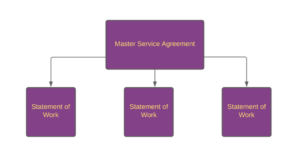We refer to MSAs regularly here at Contora, so we have written this blog to ensure everyone is on the same page in terms of fully understanding what one is, and how it should be used.
Definition of a Master Service Agreement
As the name suggests, this is a document relating to the supply of a service transaction. It is a contract between two parties that details the expectations of both parties. It is a bi-directional document that sets out most of the conditions between the two parties.
How a Master Service Agreement helps, and why to use one
The MSA is a broad agreement. The aim is to speed up and simplify future contract negotiations.
It doesn’t contain specific details of an individual contract or task – this will usually be found in a Statement of Work which would accompany an MSA.

The Master Service Agreement sets expectations on the significant elements which are unlikely to change over time in the event that the same supplier carries out multiple projects.
The kind of top-level information it would detail include: the metrics that will be used to measure performance, penalties for missing targets, payment terms, confidentiality restrictions and so on.
An MSA can sometimes be a complex document. By negotiating all of these terms in advance of a live job, it just leaves the detail of the specific contract to be decided when a new project arises. This avoids the time pressure of having to address potentially complicated issues at an already busy period in a contract lifecycle.
Once you have a Master Service Agreement in place between an engager and a supplier – you can then act quickly with the new project, via a Statement of Work because all the main contractual details have already been dealt with.
A Masters Service Agreement allows the service given / received to be measured and justified.
You should negotiate different, specific Master Service Agreements for each relationship, rather than using a blanket approach (although obviously once you have done one, you will have worked out what your key priorities are).
What a Master Service Agreement should contain
An MSA is likely to contain the following key information, agreed between both parties:
- Scope of the services it covers
- All stakeholders
- Service provider’s responsibilities
- Engager’s / client’s responsibilities
- Communication expectations
- Performance metrics eg:
- Response times
- Resolution times
- Penalties / bonuses
- Confidentiality / security arrangements
- Indemnifications
- Exclusions
- Dispute resolution
- Compensation
- Risk management / disaster recovery plan
- Periodic review
- Termination
- Signatures
If you want to ensure a contractor is operating ‘outside of IR35’ it is essential that you document your ways of working and demonstrate through your Statements of Work and other means, that the contractor is not a ‘disguised employee’.
Your Master Service Agreement is an important tool when using Statements of Work – which in turn, are an important tool in helping to demonstrate an outside of IR35 assessment, however, be aware that an MSA alone is not enough.
Have you seen a demo of Contora yet? Book yours now.
CONTORA® is a collaboration platform allowing all contractors, consultants, clients and intermediaries to operate on a common framework ‘outside’ of IR35.




